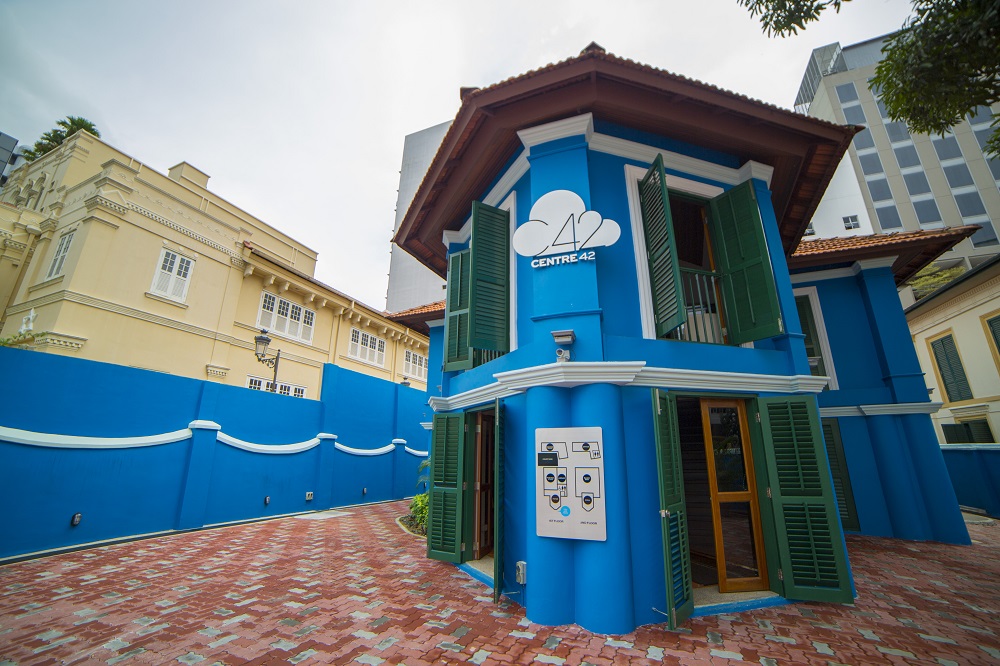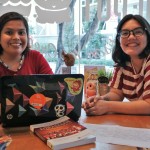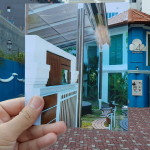And just like that, Centre 42 is three years old! But even though we’ve called 42 Waterloo Street our home since April 2014, we still get curious passers-by knocking on our office door sometimes. “What is it that you do here?” they’d ask.
We’re not surprised – the exterior of our pre-war bungalow doesn’t give much away. Especially if you compare it to the 2000s, when its main occupant was Action Theatre. An outdoor stage and rows of curved wooden benches used to take up half the front courtyard, while diners would wander in and out of the semi-alfresco restaurant that occupied the other half.
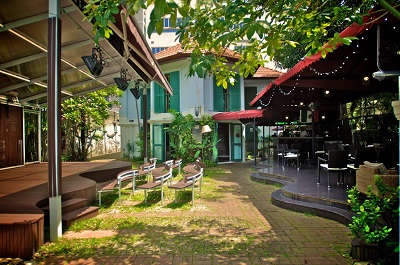
42 Waterloo Street when it belonged to Action Theatre and Casa Latina restaurant. Photo: Casa Latina’s Facebook page
However, in 2013, the theatre company and the restaurant tenant moved out. The National Arts Council announced an open call for proposals for what they envisioned as “a centre for the development of text-based works” to take over the space. It would be opened in 2014.
Upon hearing this, a group of four seasoned local arts practitioners calling themselves TAFY submitted their proposal, which was partly based on the UK’s National Theatre and Royal Court. TAFY stands for Two-And-Fifty Years, as 2014 would mark the 52nd anniversary of Mimi Fan. Lim Chor Pee’s play is widely regarded as the first Singapore English Language play to be written.
TAFY’s members included Casey Lim, an actor and director who used to be the associate artistic director of Theatreworks and was a co-founder of Checkpoint Theatre; Robin Loon, a playwright, academic and dramaturg; Chiu Chien Seen, a chartered accountant and independent producer who also co-founded Checkpoint Theatre; and Michele Lim, a producer, arts management consultant and theatre educator.
“There had always been talks, since the 1990s, about the lack of consistent new writings for Singapore,” Casey recalls. “Very often, Robin and I would chat about the many issues facing Singapore English Language Theatre. This is one of his many pet subjects.”
TAFY’s proposal was selected, and its members – who became the founding board of directors – called the new space Centre 42. The name is a nod to Centre 65, a now-defunct arts centre founded by the late playwright Goh Poh Seng in the early days of Singapore’s independence.
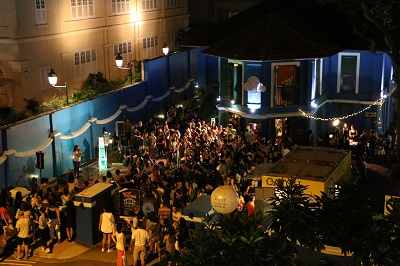
We welcomed over 3,000 people in one night at the 2016 edition of Late-Night Texting.
And so 42 Waterloo Street was given a fresh coat of dazzling blue paint, and Centre 42 began operations on 21 April 2014. It is to be a home dedicated to the creation, documentation and promotion of texts and writings for the Singapore stage. A range of programmes, which are named after various spaces in a house, were conceived to engage with both practitioners and arts enthusiasts.
We hold regular events that members of the public are welcome to attend, such as our Living Room talks and Vault presentations. Once a year, we go all out for Late-Night Texting, an after-hours affair of bite-sized, text-based experiences that’s held in conjunction with the Singapore Night Festival. We also have theatre festivals and other groups putting on shows in our Black Box every month or so, such as the currently on-going production of Every Brilliant Thing by Bhumi Collective, which you can read about here.
When these events take place, our house comes to life. But you’d be sorely mistaken if you think that we don’t get up to much on a day-to-day basis – because the real magic is happening behind the scenes.
A safe space to create
For instance, our Boiler Room programme gives aspiring playwrights the chance to go through a long-term incubation process, without the pressure of having to stage the work at the end of it. When a script is ready, we invite industry producers to come for a test read and see if they’d be interested to pick up the work and take it to the next stage of development.
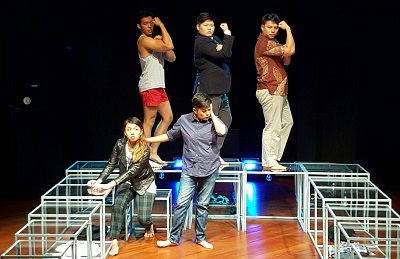
Tan Liting’s “Pretty Butch”, staged at the 2017 M1 Singapore Fringe Festival.
“I think sometimes works get pushed into production when they’re not quite ready, and then the producers suffer [financially] because of this,” says notable local playwright Alfian Sa’at. “Centre 42 provides artists with a laboratory space where they can devise their works, rehearse in subsidised or sponsored spaces, and test-run their works-in-progress with audiences. I can’t stress how important this is.”
We’ve taken on ten participants for Boiler Room over the last three years, including Tan Liting, whose play Pretty Butch enjoyed a sold-out run in our Black Box as part of the M1 Singapore Fringe Festival this year.
“I think Boiler Room gives you the benefit of being able to fail,” says Liting. “We look at failure as such a bad thing, but really it’s part and parcel of the process. Boiler Room is that cushion that says, ‘Yeah okay, it’s not a good play, it’s not a bad play, but these are the things that you can do.’”
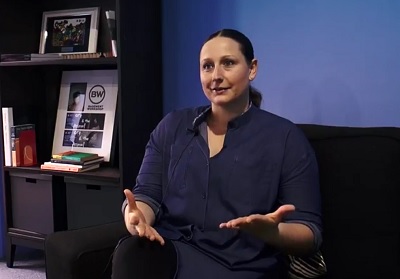
Edith Podesta being interviewed by the Centre 42 team about her Basement Workshop journey for “Dark Room”.
Our mission to provide a safe space for artists to create new works extends to other independent collectives as well. To date, we’ve supported the development of 17 projects through Basement Workshop, and rehearsals are taking place behind our blue walls all the time. But while we wouldn’t recommend passers-by to stick their heads into the rehearsal rooms unannounced, video recordings of their works-in-progress are available on our website and YouTube channel.
“Centre 42’s Basement Workshop is an invaluable initiative for an [independent] artist,” says Edith Podesta, whose play, Dark Room, was developed here between February and April 2016. “It provided an affordable home for the creation of Dark Room – a place where we could rehearse and hold meetings, and [it was] a safe, quiet, intimate space where I could hold the interviews that would eventually become part of the script. The series of video interviews made by Centre 42 during the final development phase helped me articulate the process behind the final production, and became a great resource for anyone interested in knowing more about the production.”
Tan Shou Chen, who had just completed his two-month residency here with his collaborator, Bangkok-based Jaturachai Srichanpen (aka Chuan), adds: “This process has been a luxury. I mean, this is the way that work should be created. We should be having deep conversations, and have the space to get angry at each other, and the space to make up and just to figure things out.”
Shou Chen and Chuan’s new work, Open Waters, will be making its debut in the form of a dramatised reading as part of the Bangkok Theatre Festival later this year, and the duo are hoping to bring it back to Singapore sometime in 2018.
Off-Centre 42
Open Waters isn’t the only international project that we’re involved with. We also helped to establish the Asian Dramaturgs’ Network (ADN) with Lim How Ngean when the performance-maker, dramaturg and dance researcher approached us with his proposal a couple of years ago. While the dramaturgs’ hand in a performance may not be immediately apparent, they are certainly more than just the “third eye” that observes the artist’s creation process. In fact, they often play a crucial role backstage in shaping the final work, by offering insight and knowledge on how to bring it to its full potential.
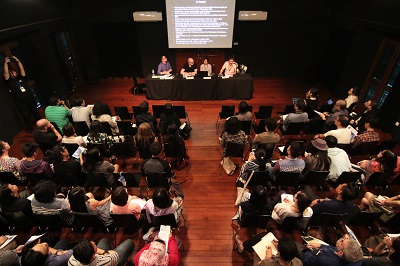
A talk at the inaugural ADN Symposium taking place at Centre 42 in 2016.
But since the discipline is still in its infancy in this part of the world, How Ngean came up with the idea of forming a community, so that those who are practising dramaturgy in the Asia-Pacific region can come together to discourse and share their expertise with each other.
“It’s important to start talking about dramaturgy now because this thing called the contemporary performance keeps changing in its complexity, its layering and its media,” he says. “And so one way to tackle or to look at it is through the lens of dramaturgy.”
The first ADN Symposium was held at Centre 42 and the Esplanade Theatre Studio in April 2016, with Centre 42 taking on the role as its main institutional partner. We brought over 20 speakers from 12 countries to Singapore, and it was very well attended by both practitioners and interested members of the public from around the region. The project flew the nest this year and took off to Japan as part of TPAM – Performing Arts Meeting in Yokohama. We’re currently in the midst of planning for the upcoming editions in different countries.
So yes, from the main street, Centre 42 doesn’t always look like the most bustling place on the block. And compared to what production companies do, our work doesn’t sound nearly as glitzy or glamorous. But as a theatre development space, we support artists and collectives in their craft, and strive to nurture the next generation of theatre makers. We hope that one day, they will be able to look back and remember the times that they spent exploring new ideas and getting to know other practitioners in that safe, quiet little blue house at 42 Waterloo Street.
By Gwen Pew
Published on 21 April 2017
Read more about Centre 42’s full suite of programmes here, and stay updated with our upcoming events on our Facebook page.

